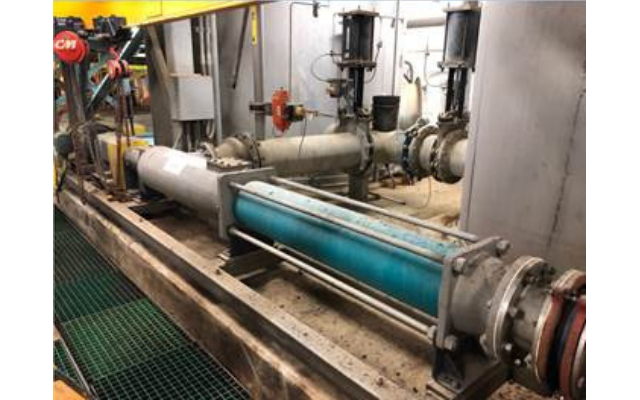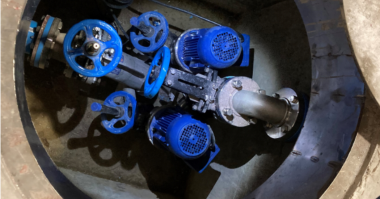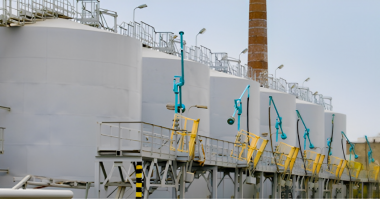Author: David Kirk, Business Field Manager, Food and Pharmaceutical
Processing oranges on a large scale requires fluid handling systems that can meet challenging transport requirements
Food manufacturers desire state-of-the art process automation to optimize production, deliver greater volume, and maintain consistent quality. Tropicana is no exception and is one of the largest processors of orange juice in the world. To meet the demand of the millions of gallons consumed annually, large scale facilities are required to process the oranges in a commercial/industrial environment.
Tropicana has a reputation for innovation and meeting challenges faced in their industry. Partnering with a company, like NETZSCH, who has the same exacting standards and dedication to cutting edge solutions was imperative to meeting the challenges.
The juice, pulp, peel and seeds all require fluid handling systems that can efficiently process, transport, dispose of unusable waste as well as assist in the packaging of each final product. Whether it is the product or the collateral waste, the sheer volume that is processed is enormous.
Progressing Cavity Pump Solutions
Unlike other types of pumps, the progressing cavity pump offers unique advantages for various processes. It primarily consists of a single helix metallic rotor turning inside a double helix elastomeric stator. The sealing line between the rotating and stationary parts creates distinct cavities that transport the product smoothly from the suction side to the discharge side.
The NEMO® product line of NETZSCH Progressing Cavity Pumps are routinely used for pumping fluids with or without solids, shear sensitive fluids, and fluids covering a wide range of viscosities. They also provide gentle handling and constant flow without pulsation which is especially important in juice production. The pumps are easy to maintain, and have additional features to enable the efficient handling of products with a high content of solids.
Progressing Cavity Pumps for Consumable Products
On the consumable product side, progressing cavity pumps are used in Pulp Stabilization Systems. The citrus pulp is pumped through a heat exchanger/ stabilizer at typical rates of 50 gallons per minute at 600 psi to have the pulp stored for reintroduction into certain orange juice products. The high pressure capability and shear characteristics of the pump, make it a good choice. The pulp is then sold internationally for use in other styles of drinks.
Since orange peel is used for cattle feed, it is a product that has market value. Therefore it has to be processed and transported. Progressing cavity pumps are also used for the handling, processing and transportation of these secondary products and other disposable products.
The NETZSCH Progressing Cavity Pump used in the process at Tropicana for handling peel feed is an open hopper pump with auger and force feed chamber to increase the efficiency of the pump. NETZSCH used FDA compliant materials for the construction of this pump.
Progressing Cavity Pumps’ Advantages over the Screw Conveyor
Originally the peel feed, which has to be moved from the Reaction Tank to the Peel Press, was transported by a Screw Conveyor. This arrangement was messy and also a safety concern as it created the possibility of introducing pet pathogens to other areas of the process.
The Screw Conveyor was not an efficient system with spillage that caused added safety issues and downtime. The peel feed is harmful with citric acid, pectin, and other substances that are highly corrosive. This slurry is also rough and abrasive, leading to excess damage to equipment. Due to the unique requirements of this application, commercially available stator materials were not the solution.
NETZSCH engineers evaluated the requirements, and using their experience and expertise, designed a NEMO® Progressing Cavity Pumping System with specialized materials. Replacing the Screw Conveyor with a NETZSCH pump provided a reliable and efficient solution for Tropicana.
An interesting fact is that the presence of citric acid is not uniformly distributed in the fruit. To process juice or peels, the equipment materials have to be selected for their ability to handle low pH conditions— the juice being in the pH range of 3.1 to 3.8, while the pH for the peels is much lower ranging from 2.0 to 2.6. This makes the slurry that removes the waste aggressively acidic, requiring the pump component materials to be carefully selected to handle the appropriate pH.
NETZSCH Progressing Cavity pumps are designed and manufactured with special attention to the material specifications. The metallic parts of the pump are stainless steel to prevent corrosion, and the stator consists of specially compounded ingredients and elastomers to maintain integrity at low pH and a wide range of temperatures.
Solutions Specific to Location
Our engineering team in Brazil developed the unique elastomer stator (PCI) since the standard Buna and Viton elastomers would not be suitable for this application. The highly abrasive peel feed slurry consisting of 30% solid content placed additional demands on the elastomer that were mitigated by the specially blended polymers.
The stator is key to the success of the progressing cavity pump in difficult applications, as it has to provide a balance of consistently high performance standards of rheological, mechanical and chemical properties. In this application, acidic resistance due to the low pH, as well.
NETZSCH pumps employ specially compounded elastomers for low pH environments. The Research and Development engineers at NETZSCH have invested heavily in testing and validating the results of these special stator compounds in the lab and field tests. These high performance elastomers are functioning reliably and successfully in the orange peel slurry pumping application.
NETZSCH pumps have been used for many years at the Tropicana facilities in Bradenton and Fort Pierce. There are a total of four pumps, two at each location. Since the most recent upgrade to special stators in 2015, the pumps have been operating flawlessly, resulting in significant savings to the customer in energy and maintenance costs.
Tropicana officials feel that NETZSCH Pumps have provided a very good solution to them for handling the orange peel waste slurry, and that the NETZSCH Progressing Cavity Pump System is a better alternative as compared to a screw conveyor.
Tropicana is one of the largest processors of orange juice. It is no surprise that while oranges are grown in California, Texas and Florida, more than 80% of the orange juice output is primarily produced in Florida, where Tropicana is headquartered.
A Natural Partnership
NETZSCH has a major presence in both Brazil and United States — two of the world’s largest orange growing countries. Consequently, NETZSCH is strategically positioned to support the needs of the citrus processing industries with its product and market knowledge, experience and expertise, and geographical proximity to the customer.
This success and effective solutions resulted from a positive partnership between NETZSCH and Tropicana to insure the mission of providing great taste in each bottle of juice.





Comments